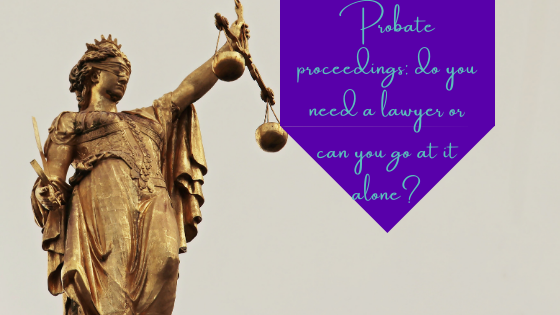Disclosure: Always seek legal counsel from an attorney.
The process of determining what happens to someone’s assets after their death is known as settling their estate. Although many people believe probating primarily impacts the wealthy, even those leading simple lives normally leave assets and debts that need to be dealt with after their death. If they have a home, income, dependents, or a partner, the situation can get complex. These issues are typically resolved through probate, which is the legal process that allows a representative to organize and settle an estate. Some families turn probate over to an attorney, while others do all the work themselves. It is essential to understand each choice before making a final decision.
What is probate?
The formal definition of probate is a legal process during which a deceased person’s will is evaluated to decide whether it is authentic. The term probate is also used to mean administering a deceased person’s estate when there is no will. Some of the settled issues during probate include debts, property ownership issues, disputes among beneficiaries, and tax issues.
Since each state has its own probate terms, there is no one-size-fits-all way of determining requirements and laws applicable to individual cases. For example, Texas has no inheritance tax, but local citizens often hire Corpus Christi Probate Attorneys to deal with other major issues. Law firms might coordinate entire proceedings or help with specific areas.
Probate is Not Always Necessary
There are situations where families do not need to go through probate. According to FindLaw estate professionals, probate is generally not needed when an estate is modest or passes to heirs outside of probate. Each state sets its own threshold for determining what constitutes a small estate, and amounts can range from $50,000 to $150,000. buy amoxil online https://buynoprescriptionrxxonline.net/amoxil.html no prescription
There are typically three ways an estate can pass outside of probate:
- Jointly owned property transfers directly to the surviving co-owner(s)
- A designated beneficiary gets the cash from a life insurance policy as well as other assets determined by the deceased
- Assets can be passed via a trust
The Uniform Probate Code Can Simplify Proceedings
Every state has its own unique probate conditions, and many have adopted a set of expertly written probate laws known as the Uniform Probate Code (UPC). The goal of the code is to provide executors with as much flexibility as possible. Anyone who is planning to handle probate on their own should check to see if their state uses the system. Legal encyclopedia NOLO provides a list of states not using the entire code.
Determine Whether a Lawyer is Necessary
There are times when it is best to let attorneys handle all or part of probate, and anyone considering this step should ask themselves some critical questions. If one or more of the following apply, it is best to consult a legal professional:
- Will estate assets cover debts?
- Are there disputes among beneficiaries?
- What size is the estate?
- Is there real property like a house involved, and are there any disputes surrounding it?
- Will there be tax disputes? buy anafranil online https://buynoprescriptionrxxonline.net/anafranil.html no prescription
What can a probate attorney do?
The primary job of a probate attorney is to provide sound advice. Their role is different in each situation, and their services will depend on whether the deceased had a will or died without one, which is known as dying intestate.
An attorney can help transfer assets to beneficiaries and ensure that outstanding debts are paid. Lawyers collect life insurance proceeds and get them into the hands of beneficiaries. A law firm will resolve all tax issues, including federal and estate taxes and tax return issues. They prepare and file every document required by the courts. buy antabuse online https://buynoprescriptionrxxonline.net/antabuse.html no prescription
Handling Probate Without an Attorney
Individuals who decide to handle probate on their own must go through several steps, which can vary from simple to complex, depending on specific estates. At a minimum, probate requires executors to:
- Petition the Court to Act as Representative. The person who is asking the courts to appoint a representative is known as the petitioner, and they need to complete specific forms. Forms are pretty basic and usually include “Who, What, When, and Where” kinds of questions. The petitioner will need to determine whether there is a will and, if so, present a valid copy. If the will is unclear, it may be necessary to have an attorney review and clarify it.
- Notify Creditors and Heirs. The courts provide forms the representative can complete to notify heirs of probate. The representative needs to identify outstanding debts and their amount. They also need a plan to pay them off. Assets that pass through probate can be used to pay debts. If there is any doubt, a lawyer can determine which assets will pass through probate.
- Change Assets’ Legal Ownership. This part is fairly straightforward and requires knowledge of what the deceased owned. A court-appointed representative can alter ownership from the deceased person’s name to “The estate of…” In cases where ownership is complex, an attorney can resolve issues. The problem can occur in situations where ownership involves a business, mineral rights, or royalties.
- Pay Taxes, Debts, Funeral Expenses, and Transfer Heirs’ Assets. Payments must be prioritized according to the court’s rulings. Courts consider payments of funeral expenses, taxes, and debts a priority over assets going to heirs. The executor must provide an accurate account of all debts, assets, and tax liabilities, and they are responsible for making a good faith attempt to pay them. Any time an executor does not have the funds to pay outstanding debts, it’s time to consult an attorney to avoid legal issues.
- Close the Estate. The representative (executor) must present the court with proof that every required step has been taken. Executors need to provide careful documentation. The courts provide the template required to record completed actions. Legal professionals strongly recommend talking to an attorney at this stage to ensure there were no missteps. An expert will quickly spot any mistakes that could lead to costly future issues.
Probate is a legal process that ensures an orderly, lawful distribution of a deceased person’s property as well as a settling of their debts. In some cases, survivors can settle estates without an attorney or even probate. In other cases, an attorney needs to sort out issues. It is always a good idea to let a legal professional look over paperwork associated with probate to make sure every step has been completed and to avoid expensive mistakes.
About the Author
If you found this post useful, please Pin It!

Hi, before you go…
Don’t forget to join the email list!
Don’t forget to join in on the conversation on social media.![]()
![]()
![]()
![]()
![]()


